初一英语:情态动词can-must-may的用法
英语情态动词can、may、must的用法
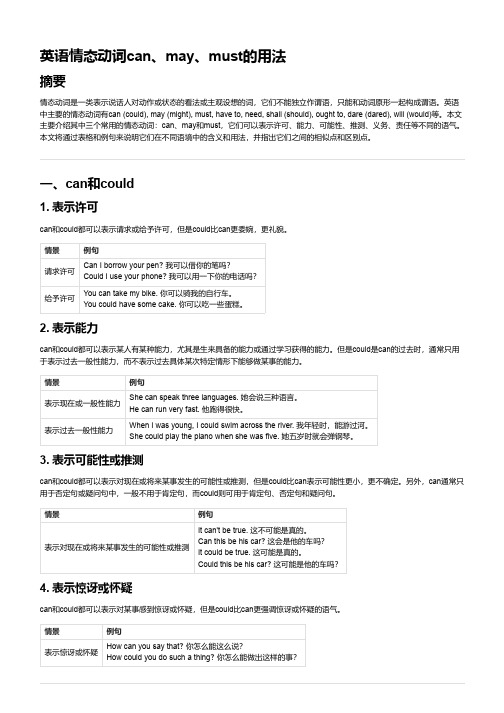
英语情态动词can、may、must的用法摘要情态动词是一类表示说话人对动作或状态的看法或主观设想的词,它们不能独立作谓语,只能和动词原形一起构成谓语。
英语中主要的情态动词有can (could), may (might), must, have to, need, shall (should), ought to, dare (dared), will (would)等。
本文主要介绍其中三个常用的情态动词:can、may和must,它们可以表示许可、能力、可能性、推测、义务、责任等不同的语气。
本文将通过表格和例句来说明它们在不同语境中的含义和用法,并指出它们之间的相似点和区别点。
一、can和could1. 表示许可can和could都可以表示请求或给予许可,但是could比can更委婉,更礼貌。
情景例句请求许可Can I borrow your pen? 我可以借你的笔吗?Could I use your phone? 我可以用一下你的电话吗?给予许可You can take my bike. 你可以骑我的自行车。
You could have some cake. 你可以吃一些蛋糕。
2. 表示能力can和could都可以表示某人有某种能力,尤其是生来具备的能力或通过学习获得的能力。
但是could是can的过去时,通常只用于表示过去一般性能力,而不表示过去具体某次特定情形下能够做某事的能力。
情景例句表示现在或一般性能力She can speak three languages. 她会说三种语言。
He can run very fast. 他跑得很快。
表示过去一般性能力When I was young, I could swim across the river. 我年轻时,能游过河。
She could play the piano when she was five. 她五岁时就会弹钢琴。
3. 表示可能性或推测can和could都可以表示对现在或将来某事发生的可能性或推测,但是could比can表示可能性更小,更不确定。
情态动词小结(共五则)

情态动词小结(共五则)第一篇:情态动词小结情态动词小结情态动词有:can(could),may(might),must,have to, shall(should),will(would),need, dare, ought to等。
一.情态动词can, may, must用法㈠基本用法1.can ⑴ 会,能够--Can you swim?--Yes, I can.--No, I can‟t.⑵口语中代替may.You can(may)park here.你可以把车停在这里。
(许可)2.may允许,许可--May I come in?--Yes, you may./Sure, come on in.--No, you mustn ‟t./No, you can‟t.No, you‟d better not.3.must必须--Must we finish the exercise today?--Yes, you must.--No, you needn‟t./No, you don‟t have to.4.need 需要,必需--Need you go now?=--Must you go now?--Yes, I must.--Yes, I must.--No, I needn‟t.--No, I needn‟t.(need作为情态动词,通常用在否定句和疑问句中。
)注意一:can 与be able to 都可以表示“能力”,区别是:⑴ can只有现在和过去两种形式I can play the piano.She couldn‟t play the piano when she was a little girl.⑵ be able to ①有更多的形式和时态We shall/will be able to finish the work next week.I haven‟t been able to find the book.②指具体一次活动I can swim but I am not able to cross the rough sea.有时两者可以互换: I‟m not able to(can‟t)answer your question.Are you able to(Can you)type(打字)?注意二:could的用法⑴ 作为can的过去式,表示过去的能力。
may must can need的用法
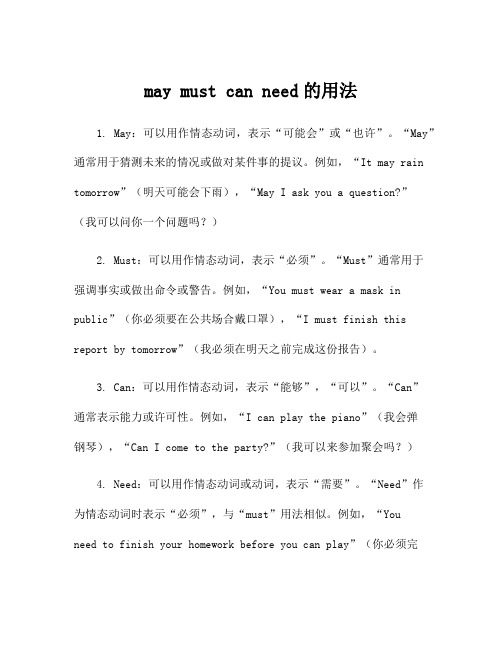
may must can need的用法
1. May:可以用作情态动词,表示“可能会”或“也许”。
“May”通常用于猜测未来的情况或做对某件事的提议。
例如,“It may rain tomorrow”(明天可能会下雨),“May I ask you a question?”
(我可以问你一个问题吗?)
2. Must:可以用作情态动词,表示“必须”。
“Must”通常用于
强调事实或做出命令或警告。
例如,“You must wear a mask in public”(你必须要在公共场合戴口罩),“I must finish this report by tomorrow”(我必须在明天之前完成这份报告)。
3. Can:可以用作情态动词,表示“能够”,“可以”。
“Can”
通常表示能力或许可性。
例如,“I can play the piano”(我会弹
钢琴),“Can I come to the party?”(我可以来参加聚会吗?)
4. Need:可以用作情态动词或动词,表示“需要”。
“Need”作
为情态动词时表示“必须”,与“must”用法相似。
例如,“You
need to finish your homework before you can play”(你必须完
成作业才能玩耍)。
作为动词时,通常表示真正的需求。
例如,“I need help with this project”(我需要帮助完成这个项目)。
情态动词may,can,must

情态动词may,can,must情态动词:本身有一定的词义,表示说话人的情绪、态度、语气,但不能单独做谓语,只能和其他动词原形构成谓语。
常见的情态动词有may,can,must,need 等。
1.may:表可能性,用于肯定句中,意为“可能”He may be a good father but he may not be a good husband.2.can:(1)意为“能,会”,表示能力,可指某人拥有某种能力例:She can cook.(2)意为“可以”,表示许可,常用语口语,可以用may替代例:Can I have a look?(3)意为“可能”,表示推测,常用于否定句和疑问句,此时“can’t为“不可能”例:This pen looks like mine,yet it isn’t.Whose can it be?这支笔看起来是我的,但它不是,它可能是谁的呢?Tom can’t be his brother,I know all of his brothers.Tom不可能是他的兄弟,我知道他所有的兄弟。
3.must:(1)表有把握的推测,用于肯定句,表示“一定,准是”例:May and Mary must be twins.They really look like each other. (2)其否定形式mustn’t表示“禁止,不准,不允许”例: You mustn’t swim in the lake.(3)对must引导的疑问句回答①肯定回答用must②否定回答用needn’t 或don’t have to例:---Must I finish my homework?我现在必须完成作业吗?---No, you needn’t./ No, you don’t have to. 不,你不必。
(3)must have done一定做过某事例:I see Dad’s car downstairs.He must have come home.(4)must的反义疑问句部分:助动词英语must后面的动词在非推测情况下的用法保持一致例:He must be a worker,isn’t he?You must have learned English for many years,haven’t you?练习:()1.You ______ be very tired after a 13-hour flight from New York to Shanghai.A.canB. mayC. mustD.need()2.-I can’t find my key.-It _____ locked in your room.A.mayB.maybeC.may beD.perhaps()3.-Who told him about this news?Lily?-It ____ her.She doesn’t know the news at all.A.can’t beB.mustn’t beC.shouldn’t beD.may not be()4. -Must I do my homework at once? --No,you _______.A. needn'tB. mustn'tC. can'tD. may not()5. The children___ play football on the road.A.can’tB. canC. mustn'tD. must()6. Even the top students in our class can't work out this problem, so it___ be very difficult.A.mayB. mustC. canD. need()7. -Can you speak Japanese? -No,you ________A.mustn’tB. can'tC. needn'tD. may not()8. He isn't at school. I think he ___ be ill.A.canB. willC. mustD. has to()9. —How long may I keep the book?—You ________ keep it for two weeks.A. mayB. mustC. will()10.-- May I go out now, Dad?-- No. You ______ let your mother know first.A. canB. mayC. needD. must。
情态动词can, may, must与need的用法区别
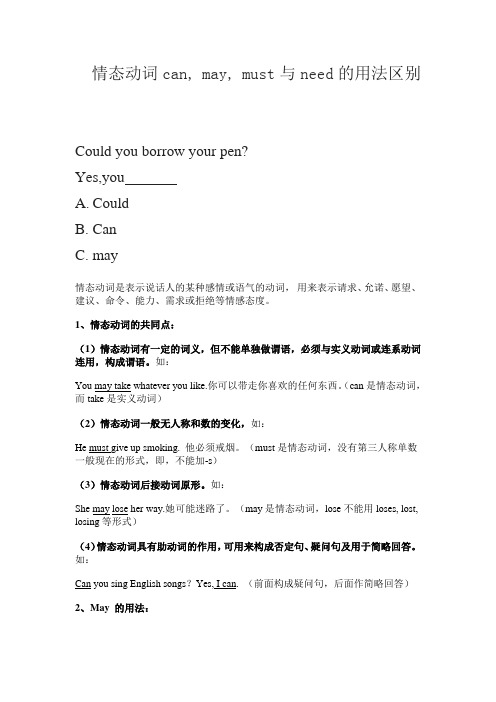
情态动词can, may, must与need的用法区别
Could you borrow your pen?
Yes,you
A.Could
B.Can
C.may
情态动词是表示说话人的某种感情或语气的动词,用来表示请求、允诺、愿望、建议、命令、能力、需求或拒绝等情感态度。
1、情态动词的共同点:
(1)情态动词有一定的词义,但不能单独做谓语,必须与实义动词或连系动词连用,构成谓语。
如:
You may take whatever you like.你可以带走你喜欢的任何东西。
(can是情态动词,而take是实义动词)
(2)情态动词一般无人称和数的变化,如:
He must give up smoking. 他必须戒烟。
(must是情态动词,没有第三人称单数一般现在的形式,即,不能加-s)
(3)情态动词后接动词原形。
如:
She may lose her way.她可能迷路了。
(may是情态动词,lose不能用loses, lost, losing等形式)
(4)情态动词具有助动词的作用,可用来构成否定句、疑问句及用于简略回答。
如:
Can you sing English songs?Yes, I can. (前面构成疑问句,后面作简略回答)2、May 的用法:。
can may must的用法
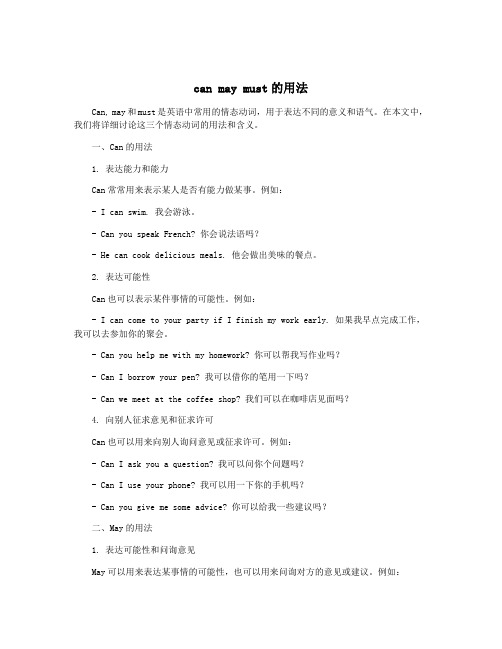
can may must的用法Can, may和must是英语中常用的情态动词,用于表达不同的意义和语气。
在本文中,我们将详细讨论这三个情态动词的用法和含义。
一、Can的用法1. 表达能力和能力Can常常用来表示某人是否有能力做某事。
例如:- I can swim. 我会游泳。
- Can you speak French? 你会说法语吗?- He can cook delicious meals. 他会做出美味的餐点。
2. 表达可能性Can也可以表示某件事情的可能性。
例如:- I can come to your party if I finish my work early. 如果我早点完成工作,我可以去参加你的聚会。
- Can you help me with my homework? 你可以帮我写作业吗?- Can I borrow your pen? 我可以借你的笔用一下吗?- Can we meet at the coffee shop? 我们可以在咖啡店见面吗?4. 向别人征求意见和征求许可Can也可以用来向别人询问意见或征求许可。
例如:- Can I ask you a question? 我可以问你个问题吗?- Can I use your phone? 我可以用一下你的手机吗?- Can you give me some advice? 你可以给我一些建议吗?二、May的用法1. 表达可能性和问询意见May可以用来表达某事情的可能性,也可以用来问询对方的意见或建议。
例如:- May I ask you a question? 我可以问你一个问题吗?- May I have your opinion on this matter? 我可以听听你对这个问题的看法吗?2. 征求许可和邀请May也可以用来征求许可或邀请别人做某事。
例如:- May I borrow your car? 我可以借用你的车吗?- May I have a glass of water? 我可以喝一杯水吗?- May I invite Jane to the party? 我可以邀请简来参加聚会吗?3. 表示礼貌在正式场合中,may也常常用来表达礼貌和尊重。
初一英语:情态动词can,must,may的用法
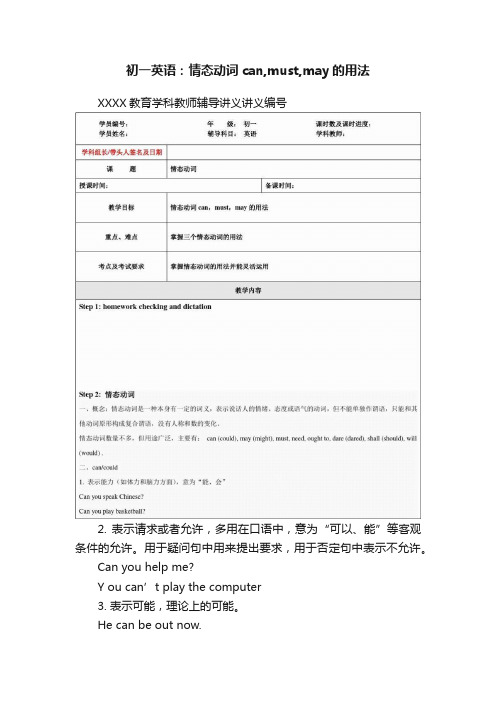
初一英语:情态动词can,must,may的用法XXXX教育学科教师辅导讲义讲义编号2. 表示请求或者允许,多用在口语中,意为“可以、能”等客观条件的允许。
用于疑问句中用来提出要求,用于否定句中表示不允许。
Can you help me?Y ou can’t play the computer3. 表示可能,理论上的可能。
He can be out now.It can’t bu sunny all the time.4. 表示说话人的猜测、怀疑、不肯定等,主要用于否定句、疑问句、感叹句中,带哟感情色彩。
How can yo be so rude!Can he be back?5. could可以作为can的过去式,也可以在提出请求时表示委婉。
He could save the little boy.Could you help me?三、may, might1. 表示“许可、准许”,此时与can同义,可以互换使用Y ou may/can go to the cinema this evening.☆注意:表许可时其答语可以用“Y es,you may.”但是由于用may做肯定回答语气显得生硬、严肃,因此一般用Y es, please. /Certainly. / Of course.这些回答显得热情、客气。
拒绝对方时,其答语可以用No, you mustn’t. / No, you can’t. / Sorry, you can’t. / No, please don’t等--May I come in? --Y es, please--May I use your ruler? --Certainly. Here you are.2. 表示可能性时,常用在肯定句中,意为“可能、也许”He may be very busy now.He said that she might not be at work today.3. can和may都可以表示推测。
情态动词can, may, must与need的用法区别.doc
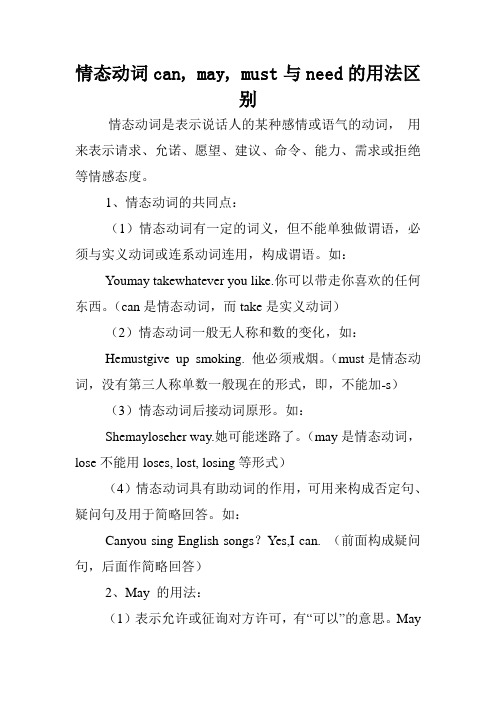
情态动词can, may, must与need的用法区别情态动词是表示说话人的某种感情或语气的动词,用来表示请求、允诺、愿望、建议、命令、能力、需求或拒绝等情感态度。
1、情态动词的共同点:(1)情态动词有一定的词义,但不能单独做谓语,必须与实义动词或连系动词连用,构成谓语。
如:Youmay takewhatever you like.你可以带走你喜欢的任何东西。
(can是情态动词,而take是实义动词)(2)情态动词一般无人称和数的变化,如:Hemustgive up smoking. 他必须戒烟。
(must是情态动词,没有第三人称单数一般现在的形式,即,不能加-s)(3)情态动词后接动词原形。
如:Shemayloseher way.她可能迷路了。
(may是情态动词,lose 不能用loses, lost, losing等形式)(4)情态动词具有助动词的作用,可用来构成否定句、疑问句及用于简略回答。
如:Canyou sing English songs?Yes,I can. (前面构成疑问句,后面作简略回答)2、May 的用法:(1)表示允许或征询对方许可,有“可以”的意思。
May not表示说话人“不许可”。
如:May I use your computer? 我可以用你的电脑吗?You may not go.你不可以去(2)在回答may 引导的疑问句时,肯定回答用may,否定回答用can’t或mustn’t,can’t表示“不可以,不能”,mustn’t表示“不准”。
如:-May I smoke here?我可以在这儿抽烟吗?-Yes,you may. /No,you mustnt. 是的,你可以(不,你不准)。
(3)may表示推测,意思是“可能”,否定形式may not 表示“可能不”。
You may be right. 你可能是对的。
(4)might是may的过去式,但表推测时,它并不表过去时态,它所表示的可能性比may小。
英语词汇学习----can,may,must 等情态动词在陈述句中的用法

英语词汇学习----can,may,must 等情态动词在陈述
句中的用法
1. can 的用法:
(1)表示能力、许可、可能性。
表示能力时一般译为“能、会”,即有种能力,尤其是生来具备的能力.如:She can swim fast, but I can’t . 她能游得很快,但我不能。
(2)表示许可,常在口语中。
如:You can use my dictionary. 你可以用我的字典。
(3)表示推测,可能性,意为“可能”,常用于否定句和疑问句中,此时can’t 译为“不可能”。
如:
—Can it be our teacher?
那个人有可能是我们老师吗?
—No, it can’t be our teacher. He is on a visit to the Great Wall.不可能。
咱们老师正在游览长城呢。
(4)could的用法:
(1)can的过去式,意为“能、会”,表示过去的能力。
如:
He could write poems when he was 10.
他十岁时就会写诗。
(2). could在疑问句中,表示委婉的语气,此时could 没有过去式。
英语:can may must用法总结

can may must的用法情态动词有can (could), may (might), must, have to, shall (should,will (would),dare (dared), need (needed),ought to等. 情态动词无人称和数的变化;不能单独使用,必须与其后的动词原形构成谓语一、can, could1)表示能力(体力、知识、技能)。
Can you lift this heavy box?(体力)Mary can speak three languages。
(知识)Can you skate?(技能)此时可用be able to代替。
Can只有一般现在时和一般过去式;而be able to则有更多的时态.I’ll not be able to come this afternoon.当表示“经过努力才得以做成功某事"时应用be able to,不能用Can。
如:He was able to go to the party yesterday evening in spite of the heavy rain。
2)表示请求和允许。
-————Can I go now?—-——- Yes, you can。
/ No, you can’t。
此时可与may互换.在疑问句中还可用could,might代替,不是过去式,只是语气更委婉,不能用于肯定句和答语中。
———— Could I come to see you tomorrow?———- Yes,you can. ( No, I'm afraid not。
)3) 表示客观可能性(客观原因形成的能力).They’ve c hanged the timetable,so we can go by bus instead。
This hall can hold 500 people at least。
情态动词must。can。could。may。might表推测的用法

情态动词must。
can。
could。
may。
might表推测的用法情态动词can / could表示推测时,意思是“可能、有可能”,语气比must弱。
XXX用于现在和将来,could用于过去。
1)表示可能性时,can / could后面接动词原形。
He canbe American。
= It is possible that he is American.他可能是个美国人。
2)表示不可能性时,用XXX。
He can`t be American。
=It is impossible that he is American.他不可能是个美国人。
3)can / could还可以表示“会、能够”的意思。
He can speak Chinese.他会说中文。
4)在疑问句中,XXX表示请求、允许、建议等意义。
Can you help me?你能帮我吗?Could you please pass me the salt?你能把盐递给我吗?3.may / might的用法1)may / might表示推测时,意思是“可能性很小”,语气比can / could更弱。
He may be American。
= It is possible thathe is American。
but the possibility is small.他可能是个美国人,但可能性很小。
2)may / might还可以表示请求、许可、建议等意义。
May I use your phone?我可以用你的电话吗?Might I suggest a different approach?我可以建议一种不同的方法吗?3)在虚拟语气中,XXX表示“可能性很小,甚至不可能”,表示一种假设的情况。
If I had studied harder。
I might have passed the exam.如果我学得更努力,我可能会通过考试。
总之,情态动词must。
情态动词can,may,must的用法[1].
![情态动词can,may,must的用法[1].](https://img.taocdn.com/s3/m/bcf311f09e3143323968938d.png)
三、may的用法 的用法
1.许可 许可
表示许可时,无甚区别, 较正式, 较口语化。 表示许可时,无甚区别,may较正式,can较口语化。 较正式 较口语化 could/might则是一种委婉的表达 则是一种委婉的表达 May/might….? 回答: 回答:yes,…may./ no, …can’t. ,
7. -Who is the boy over there? Is it John? -No, it ________ be him. John is much taller. A. mustn't B. may not C. can't D. needn't 8. -Can you play Frisbee, Jay? -Yes, I ________. It's easy. A. must B. can C. need D. may 9.-You must come back every month. -Yes, I ________. A. will B. must C. should D. can 10. She ________ know the answer, but I'm not sure. A. maybe B. may be C. may D. must 11. - Must we clean the room right now? - No, you____. You____ clean it after lunch. A. needn’t;may B. needn't; must C. Mustn't; can D. mustn't;may
1.You may go home now,Susan. 2.You may not smoke in the classroom. 3.May I sit down? —Certainly./ Yes,please./ Why not?/ Sure. —No, I am sorry./ I’m afraid you can’t. 4.I may borrow this book, mayn’t I? 2.猜测、可能性(用于肯定句或否定句中) 猜测、可能性(用于肯定句或否定句中) 猜测 may not 可能不
周练周总结:情态动词must、may、can的用法

易错点
must与have to的用法区别
① 强调重点不同
两者都有“必须”的含义,但must强调说话者主观看法,而have to强 调客观需要,含有“不得不”、“被迫”之意。 例:I must go home now. 我现在要回家了。 (我想回家)
I have lost my pen, so I have to buy one. (不得不买,有被迫之意。) 我的钢笔丢了,所以得去买一支。
由题干“看起来好像不会下雨”可推断,你“不必”带雨伞,故选 needn’t(不需要)。
结束 高效上好每节课·快乐上好每天学
2.表示推测时,意为“肯定,一定” 用must be。
例:They must be at home. The light is on. 他们肯定在家,灯亮着呢。
3.must not(mustn’t)表示禁止,意为“不能,不许”。
例:You must not tell lies. 你不许撒谎。
Must I come before 6:30 tomorrow ? Yes, you must./ No, you needn`t.
高效上好每节课·快乐上好每天学
方法三:解答情态动词的题目时,一定要注意说话人 的语气或情感,并结合具体的语境来分析和判断
3. It doesn’t look like rain, so you _____ bring your umbrella with you. A. shouldn’t B. mustn’t C. can’t D. needn’t
= Maybe he was wrong, but I’m not sure. 也许他错了,但我不确定。
高效上好每节课·快乐上好每天学
情态动词一can_may_must的用法

You _c__a_n___ do it this evening. 17. May I use your dictionary ? Sorry , you __c_a_n__’t___.
I am using it now .
18. Look at the ground .It’s very wet .It _m___u_s_t_
5.I____m_u_s_t___ get up early tomorrow. because I have a meeting.
6._____C__a_n______you
a
please
open
the
12window?9. Nobody __c__a_n______live without air.
(VS: don`t have to )
a
7
may/must/need 的一般疑问句及其回答: 1. May I.........?
Yes, you can. / Yes, you must. No, you can`t. 2. Must I .........? Yes, you must. / No, you needn`t. 3. Need I .........? Yes, you must. /a No, you needn`t. 8
一、情态动词can, may, must 的用法
a
1
Modal verbs 情态动词
• 情态动词后接动词原形; • 没有人称和数的变化; • 不能单独作谓语, 与后面的动词共同作谓语; • 其否定形式在后面直接加not。
• can / can not
may / may not
• must / must not a
canmaymust的用法区别
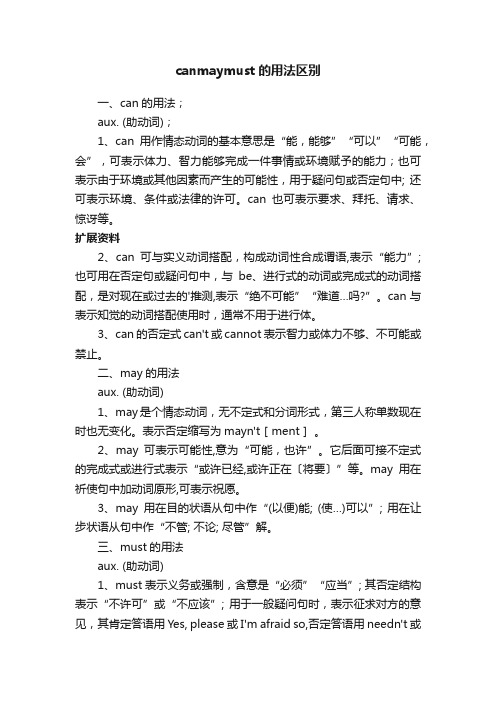
canmaymust的用法区别一、can的用法;aux. (助动词);1、can用作情态动词的基本意思是“能,能够”“可以”“可能,会”,可表示体力、智力能够完成一件事情或环境赋予的能力;也可表示由于环境或其他因素而产生的可能性,用于疑问句或否定句中; 还可表示环境、条件或法律的许可。
can也可表示要求、拜托、请求、惊讶等。
扩展资料2、can可与实义动词搭配,构成动词性合成谓语,表示“能力”; 也可用在否定句或疑问句中,与be、进行式的动词或完成式的动词搭配,是对现在或过去的'推测,表示“绝不可能”“难道…吗?”。
can与表示知觉的动词搭配使用时,通常不用于进行体。
3、can的否定式can't或cannot表示智力或体力不够、不可能或禁止。
二、may的用法aux. (助动词)1、may是个情态动词,无不定式和分词形式,第三人称单数现在时也无变化。
表示否定缩写为mayn't[ment]。
2、may可表示可能性,意为“可能,也许”。
它后面可接不定式的完成式或进行式表示“或许已经,或许正在〔将要〕”等。
may用在祈使句中加动词原形,可表示祝愿。
3、may用在目的状语从句中作“(以便)能; (使…)可以”; 用在让步状语从句中作“不管; 不论; 尽管”解。
三、must的用法aux. (助动词)1、must表示义务或强制,含意是“必须”“应当”; 其否定结构表示“不许可”或“不应该”; 用于一般疑问句时,表示征求对方的意见,其肯定答语用Yes, please或I'm afraid so,否定答语用needn't或don't have to; must在间接引语中表过去。
2、must表示必然性,一般只用于肯定句中,有时表示“意愿”,带有感情色彩。
3、must表示推测,暗含很大的可能性,一般只用于肯定句中,在否定句中表示推测用can't而不能用mustn't。
初中情态动词can,may,must 用法

一、明显区分:l.只可用can(could),表示“能力”(体力、知识、技能)例:①I can swim now,but I couldn’t last year.②Can you play me piano?Yes,I can.May:用于祈使句,表示祝愿。
May you succeed!Must:表示必须You must come in time.2.can(could)适用于各种句型和人称。
例:①肯定句:I(You,He)can swim.②否定句:I(You,He)can’t swim.③疑问句:Can I(you,he)swim?二、表示“请求”或“许可”。
can、may、must都可用,但语气和程度不同。
1.can(could)用于各种句型和大部分人称。
例:①肯定句:You(He,We)can go now.②否定句:You(He,We)can’t go now.③疑问句:Can I(you,he)go now?Yes,you can.(No,you can’t.)2.may(might)用于各种句型,但在肯定句和否定句中不用于第一称;在疑问句中不用于第二人称。
例:①肯定句:You(He)may go now.②否定句:You(He)may not go now.③疑问句:May I(he)go now?正规回答:(表定)Yes,you may.(Yes, you can)(No,you can’t./No,you mustnt.)(否定)No,you may not.口语化回答:(肯定)Yes,please.(Certainly.)(否定)No,please don’t.(No,of course not.)3.must用于各种句型和大部分人称。
例:①肯定句:I(You,He)must go now.②否定句:You(He)mustn’t go now.③疑问句:Must(you,he)go now?肯定回答:Yes,you must.否定回答:No,you needn’t.(No,you don’t have to.)4.试比较:You may not smoke here.(不可以)语气轻You can’t smoke here.(不能)重You mustn’t smoke here.(决不可)最重三、表示“可能”、“或许”和“推测”之意。
情态动词must,can,could,may,might表推测的用法:
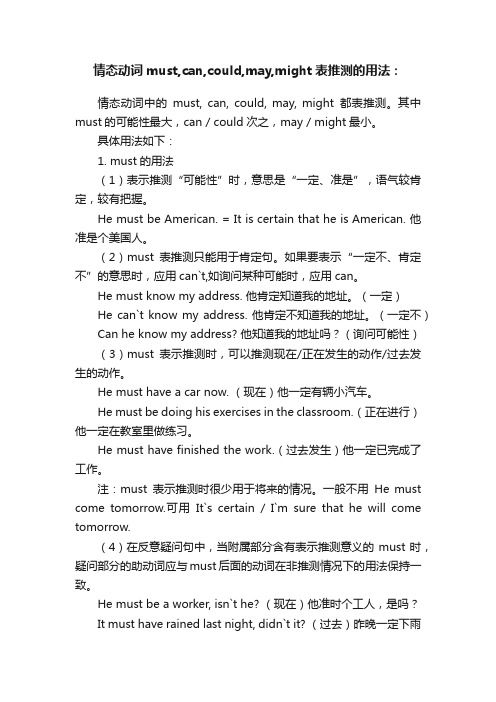
情态动词must,can,could,may,might表推测的用法:情态动词中的must, can, could, may, might都表推测。
其中must的可能性最大,can / could次之,may / might最小。
具体用法如下:1. must的用法(1)表示推测“可能性”时,意思是“一定、准是”,语气较肯定,较有把握。
He must be American. = It is certain that he is American. 他准是个美国人。
(2)must表推测只能用于肯定句。
如果要表示“一定不、肯定不”的意思时,应用can`t,如询问某种可能时,应用can。
He must know my address. 他肯定知道我的地址。
(一定)He can`t know my address. 他肯定不知道我的地址。
(一定不)Can he know my address? 他知道我的地址吗?(询问可能性)(3)must表示推测时,可以推测现在/正在发生的动作/过去发生的动作。
He must have a car now. (现在)他一定有辆小汽车。
He must be doing his exercises in the classroom.(正在进行)他一定在教室里做练习。
He must have finished the work.(过去发生)他一定已完成了工作。
注:must表示推测时很少用于将来的情况。
一般不用He must come tomorrow.可用It`s certain / I`m sure that he will come tomorrow.(4)在反意疑问句中,当附属部分含有表示推测意义的must时,疑问部分的助动词应与must后面的动词在非推测情况下的用法保持一致。
He must be a worker, isn`t he? (现在)他准时个工人,是吗?It must have rained last night, didn`t it? (过去)昨晚一定下雨了,是不是?You must have learned English for many years, haven`t you? (完成时)你一定学了好多年英语,是吗?2. can / could的用法(1)can表示推测“可能性”时,往往用于否定句或疑问句。
- 1、下载文档前请自行甄别文档内容的完整性,平台不提供额外的编辑、内容补充、找答案等附加服务。
- 2、"仅部分预览"的文档,不可在线预览部分如存在完整性等问题,可反馈申请退款(可完整预览的文档不适用该条件!)。
- 3、如文档侵犯您的权益,请联系客服反馈,我们会尽快为您处理(人工客服工作时间:9:00-18:30)。
4. 表示说话人的猜测、怀疑、不肯定等,主要用于否定句、疑问句、感叹句中,带哟感情色彩。
How can yo be so rude!
Can he be back?
5. could可以作为can的过去式,也可以在提出请求时表示委婉。
He could save the little boy.
Could you help me?
三、may, might
1. 表示“许可、准许”,此时与can同义,可以互换使用
You may/can go to the cinema this evening.
☆注意:表许可时其答语可以用“Yes,you may.”但是由于用may做肯定回答语气显得生硬、严肃,因此一般用Yes, please. /Certainly. / Of course.这些回答显得热情、客气。
拒绝对方时,其答语可以用No, you mustn’t. / No, you can’t. / Sorry, you can’t. / No, please don’t等
--May I come in? --Yes, please
--May I use your ruler? --Certainly. Here you are.
2. 表示可能性时,常用在肯定句中,意为“可能、也许”
He may be very busy now.
He said that she might not be at work today.
3. can和may都可以表示推测。
Can通常用在否定句和疑问句中,may通常用在肯定句和否定句中。
虽然两者都可以用于否定句,但是程度不同,can’t的语气比may not更强。
It can’t be true.
It may not be true.
4. 表示希望、祈求、祝愿,常可以译为“祝愿”
May you have a good time.
May you be happy.
5. might可以作为may的过去式,也可以在提出请求时表委婉;在表示可能性时,might的可能性比may 更小
☆注意:can和may的区别
1. can和may都可以表示“许可”,在征求对方意见时用may比较多May I go now?
2. 在询问客观上是否可以时,用can Can we take the books out?
3. 在两者都可以用时,may更客气一些。
